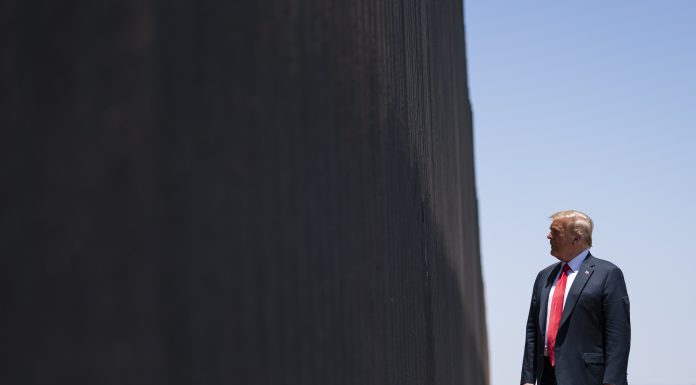(Headline USA) President Donald Trump has fulfilled a wide range of promises he made during his 2016 campaign, but he has fallen short of some promises.
It’s a theme that will play a major role in the upcoming Republican National Convention, as the president tries to convince the nation that he deserves a second term.
“I’m the only candidate that gave you more than I promised in the campaign. It’s true. I’m the only one ever, maybe ever,” Trump said at a rally in battleground Arizona last week.
He has followed through on his promises to put America first, especially on issues of trade, immigration, and foreign policy.
“I think the golden egg of Trump’s reelection effort is going to be the promises kept, such as getting two Supreme Court justices in power and keeping America out of foreign wars like Afghanistan and Iraq,” said Douglas Brinkley, presidential historian at Rice University.
Arguably Trump’s biggest impact has been on immigration.
The project is now underway, with 450 miles expected to be completed by the end of December.
And Trump has succeeded in fundamentally transforming the nation’s immigration system, despite resistance from the courts and little cooperation from Congress.
Using more than 400 executive actions, according to a recent analysis by the nonpartisan Migration Policy Institute, Trump has effectively shut down the asylum system at the southwest border and slashed refugee admissions.
At the same time, Trump has imposed a slew of new restrictions on legal immigration, with the pandemic spurring many more.
With so few visas being processed and immigration fees collected, the U.S. Citizenship and Immigration Services has all but run out of money and is about to furlough large swaths of its workforce.
Some specific promises on immigration went unfulfilled: Trump failed to create a new “deportation force,” never met his pledge to deport millions, didn’t end funding for sanctuary cities that don’t cooperate with immigration authorities and didn’t move to end the constitutional right to birthright citizenship.
But he did clamp down on “catch and release” of immigrants in the country illegally, enhance background screening of migrants and move to suspend immigration from a host of nations with high rates of terrorism.
“They have used the tools that the executive branch has on immigration really to their ultimate extent. And they’ve been successful,” said Doris Meissner, the director of the Migration Policy Institute’s U.S. Immigration Policy Program and a former commissioner of the U.S. Immigration and Naturalization Service. “And you know, in many ways remarkably so because there’s been very stiff resistance all the way.”
On health care, Republicans in Congress did repeal the Obama-era individual mandate forcing people to buy health insurance, but he failed to replace the Affordable Care Act with an alternative.
On the economy, Trump and congressional Republicans pushed through a promised tax cut early in his term that dramatically slashed the corporate tax rate — as he had promised — and doubled the estate tax threshold, but did not eliminate it.
He also did not meet his pledge to reduce the number of individual income tax brackets from seven to three to simplify the tax code.
Some of Trump’s more controversial promises have fallen by the wayside, such as his pledge to eliminate gun-free zones at schools and on military bases and to establish a national right to carry concealed weapons that would trump local restrictions.
But he delivered on other fronts. He immediately enacted a federal hiring freeze, as he had promised, and mandated that for every new federal regulation enacted, two be eliminated.
He launched an aggressive campaign to roll back environmental protections passed by the Obama administration.
At the same time, he has prioritized tapping the country’s shale oil, and natural gas and coal reserves.
However, courts are undoing many of Trump’s environmental rollbacks.
On trade, Trump renegotiated the North American Free Trade Agreement and withdrew the U.S. from the Trans-Pacific Partnership, but failed to decrease the U.S.-China trade imbalance.
On the international front, the impact has been enormous as he has put his “America First” policy into practice, fundamentally redefining America’s place in the world.
He increased funding for the military, joined the race to explore space, and has threatened U.S. membership in the outdated alliances of the 20th century, including NATO.
At the same time, he has pulled the U.S. from participation in a host of landmark accords, including the Paris Climate Agreement and the Iran nuclear deal.
At international summits, he has fostered positive relationships with potentially dangerous leaders leaders, including Russia’s Vladimir Putin, and asked for more reciprocal relationships with longstanding allies like the U.K. and Canada.
In a sign of just how far he has broken from the global community, he stopped funding the World Health Organization earlier this year.
Adapted from reporting by the Associated Press.

